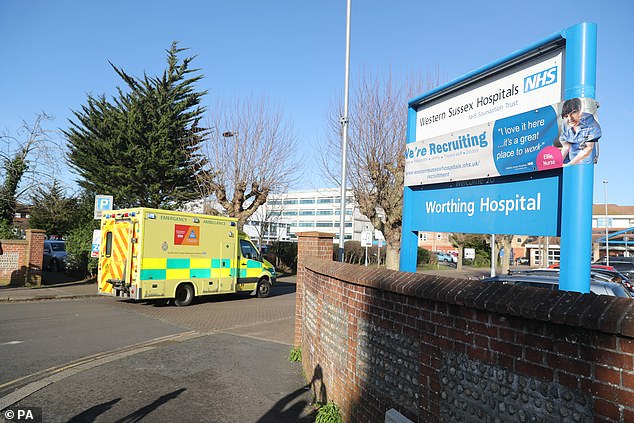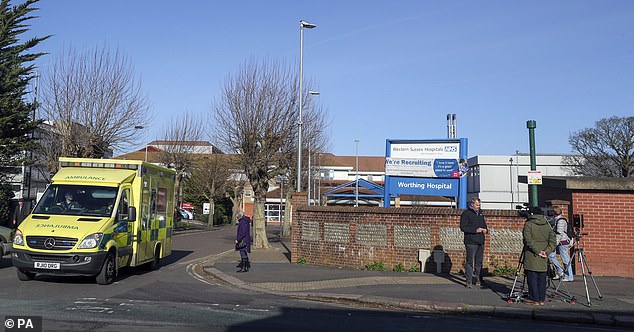Oxford-educated junior doctor is banned from treating patients after being caught moonlighting for private cosmetic surgery clinic while off sick from his £35,000-a-year NHS job
An Oxford-educated junior doctor has been banned from treating patients after he was caught moonlighting at a private cosmetic surgery clinic while on paid sick leave from his £35,000-a-year NHS job.
Dr. Daniel Coventry, 33, was due to be absent at taxpayer expense due to a suspected virus, but instead offered facial fillers, facelifts and anti-wrinkle injections at a private clinic in Brighton.
Coventry was reported to bosses at Worthing Hospital in West Sussex after concerns were raised over the amount of sick leave he was taking.
An investigation was launched in 2019 and investigators found social media posts showing that he had done private aesthetic work at A New You and his own medical practice DC Aesthetics.
Coventry claimed he had not had time to read the NHS sick leave policy and said he believed there was ‘no conflict of interest’ in doing private work while ill and ‘not rostered’ to work on NHS shifts to work.
Dr. Daniel Coventry (pictured) was due to be away at taxpayer expense due to a suspected virus, but instead offered facial fillers, facelifts and anti-wrinkle injections at a private clinic in Brighton.
He then left his job in FY2 before officials could give him a final written warning and he was reported to the General Medical Council.
Coventry was suspended from medical practice for six months after being found guilty of serious professional misconduct by the Medical Practitioners’ Tribunal Service in December 2019.
The moonlighting took place over a six-month period between April and October 2018, just a year after Coventry joined the Western Sussex NHS Trust.
In the run-up to the ban, he worked full-time in the private sector at the ‘A New You’ clinic in Brighton, where facelifts cost up to £8,000 and tummy tucks up to £6,000.
A consultant surgeon had explained HR procedures to Coventry and he was advised to go to the hospital’s ‘StaffNet’ website to read the Trust’s policy on sick leave.
In his decision, Tribunal Chairman Samantha Gray said: “Dr. Coventry chose not to read the policy, despite being pointed in the right direction by the Trust.
‘The Tribunal also considered that there was an element of deception as Dr. Coventry had not told the management of A New You, or any of his private clients, that he had been ill from work.’
Ms Gray added: ‘The Tribunal has taken into account Mr Coventry’s claim that no financial benefit was gained in this case. The Tribunal did not accept this.
‘Dr. Coventry is said to have been paid for his sick leave from the public purse, while he was also paid for private work.
‘In addition, the NHS Trust may have had to fund additional staff to cover Dr.’s absence. to cover Coventry. The further emphasizes that there is still a way to go before Dr. Coventry understands the consequences of his actions.”
Coventry was represented at the hearing in Manchester by his own father, Stuart.

Coventry claimed he had not had time to read the NHS sick leave policy and said he believed there was ‘no conflict of interest’ in doing private work while ill and ‘not rostered’ to work on NHS shifts to work.

Coventry was suspended from medical practice for six months after being found guilty of serious professional misconduct by the Medical Practitioners’ Tribunal Service in December 2019. Pictured: Worthing Hospital where he worked (stock image)
Stuart Coventry said: ‘Dr. Coventry was initially clear in his mind that he was unaware he was not allowed to work while on paid sick leave, and he presented evidence to make his point.
‘Instead of the weeklong induction that most FY2 students received at the Trust, Dr. Coventry an informal HR introduction and it was suggested that he should sort things out himself. This was not enough and Dr. Coventry was therefore unaware of the policy. In addition, Dr. Coventry’s initial educational supervisor was unable to fulfill her role due to illness.
‘But he now understands that he should have taken steps to know the Trust’s policy. He accepts that it was his responsibility to read the policy as directed and if he had done so he could have asked any questions to an appropriate person about the meaning and application of the illness policy. He accepts that his previous behavior was in breach of policy and has apologized fully for this.”
Mr Coventry added: ‘At the time of the events Dr. Coventry had the mentality of a newly qualified FY2 doctor and was naive and inexperienced. He would also like to emphasize that there was no intention to cheat or defraud his employer or cause him any loss.
“He has not specifically taken sick leave to undertake private work and has not achieved any net financial benefit. If he had been knowingly dishonest, he would not have posted about his work on social media. There was no financial benefit to Dr. Coventry.
‘Notwithstanding that, Dr. Coventry that his actions were contrary to Trust policy. He understands and accepts his naivete and errors of judgement, has apologized and has learned the lessons from the events of 2018. There were no clinical concerns in this case and there was never a risk of harm to the public or patients.”
GMC counsel Chloe Fairley told the tribunal: ‘While this is not a case where patients were at undue risk of harm, questions can be raised in relation to the reputation of the medical profession.

Coventry was reported to bosses at Worthing Hospital in West Sussex after concerns were raised over the amount of sick leave he was taking (stock image)
‘This was not a single isolated omission or error of judgment that could be quickly corrected, but the misconduct involved repeated occasions of dishonest conduct over a six-month period during which Dr. Coventry had had a number of chances where he could have been honest. . Dr. However, Coventry has put his own personal and financial interests ahead of his duties at the Trust.”
Ms. Fairley added, “Currently, Dr. Coventry has shown no real insight and he is yet to take responsibility for his actions. Members of the public have the right to have full confidence in a doctor’s honesty, and the relationship between the profession and the public is based on the expectation that doctors will act with integrity at all times.
‘Any insight that appeared to be present at the Trust inquiry in December 2019, when Dr Coventry stated that he accepted the findings of the inquiry, has been undermined by his evidence at this hearing, when he stated that he had only said for the sake of ‘moving things forward’. This was a case of deliberate deception within a professional context.’
Coventry studied medicine at Oxford after graduating with a first class degree in biology from Brighton University.
